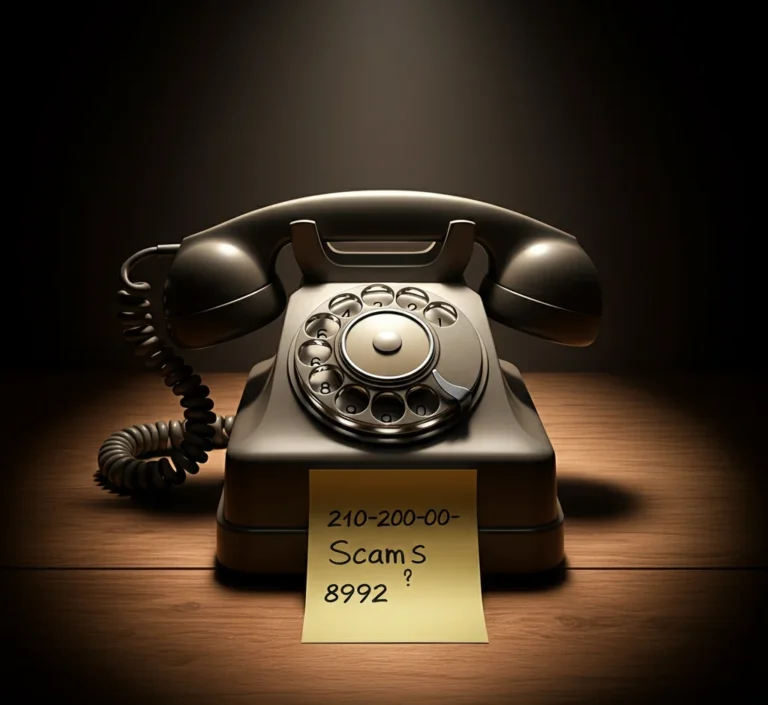
Introduction to the Scam
Have you recently received a call from 210-200-8992? If so, you’re not alone. This number has raised eyebrows and skepticism among many individuals who question its legitimacy. With scams becoming increasingly sophisticated, it’s crucial to stay informed about potential threats that lurk behind seemingly innocent phone numbers. In today’s digital age, understanding the warning signs of a scam can save you time, money, and stress. Let’s dive deeper into what makes this particular number suspect and how you can protect yourself from similar situations in the future.
How the Scam Works
Scammers often rely on psychological tricks to manipulate their victims. When you receive a call from 210-200-8992, the caller typically claims they represent a legitimate organization or government agency. They might say your account is compromised or that you’re owed money.
Once they’ve captured your attention, they’ll pressure you for immediate action. This urgency can make people act irrationally—handing over personal information without verifying the source.
They may use tactics like creating false scenarios that evoke fear or excitement, all designed to cloud your judgment. Some may even spoof numbers to appear more trustworthy.
After extracting sensitive data, scammers exploit it for financial gain. Whether it’s draining bank accounts or opening new credit lines in your name, the aftermath can be devastating and long-lasting. Be wary of anyone asking for personal details over the phone; legitimate organizations won’t operate this way.
Red Flags to Look Out For
When dealing with unknown callers, stay vigilant. Certain behaviors can be significant red flags.
If the caller pressures you for personal information right away, that’s a warning sign. Legitimate organizations typically don’t ask for sensitive details over the phone.
Another key indicator is urgency. If they claim you must act immediately to avoid dire consequences, take a step back. Scammers often create false emergencies to manipulate emotions.
Watch for poor grammar or unusual language patterns too. Many scammers operate from overseas and may struggle with fluent English or local slang.
If the number seems disconnected or unreachable after your call, it’s best to disregard further attempts at communication. Trust your instincts; if something feels off about the call, it probably is.
Steps to Take if You’ve Been a Victim
If you suspect that you’ve fallen victim to a scam involving 210-200-8992, act quickly. Document every interaction related to the call. Keep records of dates, times, and what was discussed.
Next, report the incident to your local authorities or consumer protection agency. They can provide guidance on further actions and help track down scammers.
Consider contacting your bank or credit card company if any personal financial information was shared. They may recommend placing fraud alerts on accounts or monitoring for unusual activity.
Don’t forget about identity theft protection services. It’s wise to invest in them if you believe your details may have been compromised.
Share your experience with friends and family. Raising awareness can prevent others from becoming victims of similar scams linked to 210-200-8992.
How to Protect Yourself from Similar Scams
Staying vigilant is key to protecting yourself from scams like the one associated with 210-200-8992. Always be cautious when receiving unsolicited calls or messages.
Never share personal information over the phone, especially if you did not initiate the conversation. Legitimate companies will never ask for sensitive data in this manner.
Use caller ID and call-blocking features on your devices. These tools can help filter out known scam numbers and keep unwanted calls at bay.
Consider registering your number with a do-not-call list. This can reduce the frequency of telemarketing calls that often lead to scams.
Stay informed about common scam tactics by following consumer protection websites and local news updates. Knowledge is power in recognizing red flags before it’s too late.
Other Common Phone Scams
Phone scams come in various forms, each designed to trick unsuspecting victims. One prevalent type is the IRS scam, where callers impersonate tax agents and threaten legal action for unpaid taxes.
Another common scheme involves tech support. Scammers pose as representatives from well-known companies, claiming your device has a virus and offering to fix it—often for a fee.
Romance scams also thrive over the phone. Fraudsters build emotional connections online before asking for money under false pretenses.
Prize and lottery scams are frequent. Callers inform you that you’ve won something valuable but require personal information or payment to claim your prize.
Staying informed about these tactics can help shield you against potential threats lurking on the other end of the line.
Conclusion
Scams can take many forms, and phone scams are among the most common. If you’ve received a call from 210-200-8992 or any similar number, it’s essential to stay informed about potential risks. Understanding how these scams operate helps you recognize them before falling victim.
Be vigilant for red flags like high-pressure tactics or requests for personal information. If you believe you’ve been targeted, act swiftly by documenting the details of the call and reporting it to authorities.
Protecting yourself involves being educated on various scam types and remaining cautious with unknown numbers. Remember that legitimate organizations will never ask for sensitive information over the phone.
By staying alert and aware, you can reduce your chances of becoming a victim of scams like those associated with 210-200-8992 or other suspicious callers in today’s digital landscape.